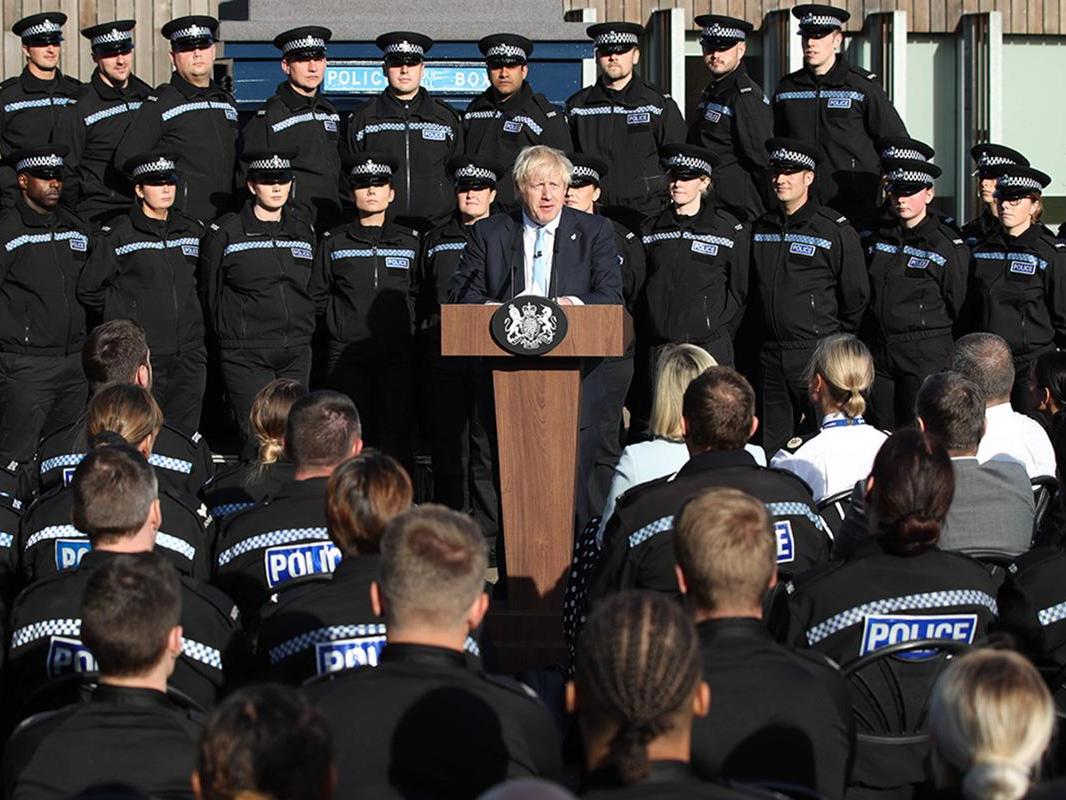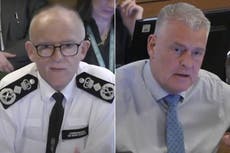Suella Braverman says police should not intervene in ‘legitimate debate’ on trans people and race
Home secretary accuses police of being too ‘politically correct’ after wave of racism and misogyny cases

Police should not be intervening in debates on “contested issues” about race and gender identity, the home secretary has said.
Suella Braverman accused forces of “pandering to politically correct preoccupations” during a speech marking the recruitment of 20,000 additional officers since 2019.
“I think that for contested issues where there's legitimate debates, freedom of expression and the lawful exchange of views should be not only allowed but actively encouraged,” the home secretary added.
“For someone to express gender critical views on social media, please shouldn't be getting involved in that – they shouldn't be getting involved, or adhering to or espousing views that are akin to critical race theory, they shouldn't be taking the knee.”
The speech came weeks after the home secretary contacted Essex Police over a hate crime investigation that saw golli*** dolls seized from a pub, with a source saying she believed officers “should not be getting involved in this kind of nonsense”.
It later emerged that the landlord of the premises had hung some of the dolls by their necks and referred to US lynchings and posted white nationalist content on Facebook.
A slew of recent criminal cases, disciplinary hearings, inquiries and watchdog reports have exposed racism and misogyny among officers, with 75 per cent of Brits saying they were concerned about the issue in recent polling.
But Ms Braverman claimed there was a public perception that “that some police are more interested in virtue signalling, or in protecting the interests of a radical minority engaged in criminality than they are protecting the rights of the law-abiding majority”.
The home secretary hit out at a small number of officers who took a knee in a gesture of support to the Black Lives Matter movement and “diversity training that promotes contested ideology like critical race theory”, claiming: “Some forces have ‘equality’ teams that have completely abandoned impartiality in favour of taking partisan positions.”
Asked by The Independent whether it was mixed messaging to accuse police of being too politically correct while calling for higher standards and tighter vetting after the murder of Sarah Everard and other scandals, she replied: “No.”
Ms Braverman said the recruitment of over 46,000 new police officers since November 2019 across England and Wales, to reach the 20,000 “extra officers” target, was a turning point.

“I want this new generation of police officers to adhere to the philosophy of common sense policing, focusing on the public's priorities … instead of spending time and resources on politically-correct distractions,” she added.
“That is not to take away anything from the challenges that policing is facing relating to standards, culture and vetting. I've been very frank about the harrowing reports that we've read and the need for fundamental reform.”
The programme has created the highest raw number of police officers in history in England and Wales, but the figure is only 2 per cent greater than a peak before the start of austerity in 2010.
Analysis by the Full Fact organisation found that the number of police officers per capita has fallen in the period because of population growth.
Thousands of police staff members, special constables and PCSOs lost during government cuts have not been replaced, nor has the experience of long-serving specialist officers who retired or were made redundant.
Asked whether the uplift programme was an acknowledgement that government austerity had been a failure in policing, Ms Braverman said it was not.

“The Conservative government has been delivering for the British people,” she added.
Senior officers have expressed concern about the proportion of the police service who are now young and inexperienced, as well as the increased risk of “unsuitable” recruits slipping through the net amid government pressure to hit targets.
The Metropolitan Police was the only force not to meet its target – falling short of its allotted number by over 1,000 – with commissioner Sir Mark Rowley saying the force had been struggling to attract sufficient recruits and was “striving to maintain quality”.
The gap meant that several forces had to over-recruit in order to hit Boris Johnson’s target, with North Yorkshire, Thames Valley, Devon and Cornwall, Northamptonshire, Derbyshire, Avon and Somerset and Norfolk going at least 20 per cent over their allotted number of additional officers.
Gavin Stephens, chair of the National Police Chiefs’ Council, told The Independent that under two in 10 people who applied to join police during the uplift made it through “rigorous assessments”.
“We know there is more work to do on vetting but we are absolutely determined that these colleagues come in with the right public service motivation, with the skills and experience to help us become more effective, and it’s changing how policing looks and feels,” he added. “We’ve not dropped our standards at all.”
Home Office figures show that while the uplift programme has caused an increase in the proportion of female police officers, and those who are Black and from other ethnic minorities, they are still not representative of the wider population.
Mr Stephens would not be drawn on whether he agreed with the home secretary’s remarks on political correctness, saying: “My view is very strongly that the thing that earns us back trust and confidence with our communities is to focus on the things that matter most to them. They can be many and varied.”
Join our commenting forum
Join thought-provoking conversations, follow other Independent readers and see their replies
Comments


Bookmark popover
Removed from bookmarks